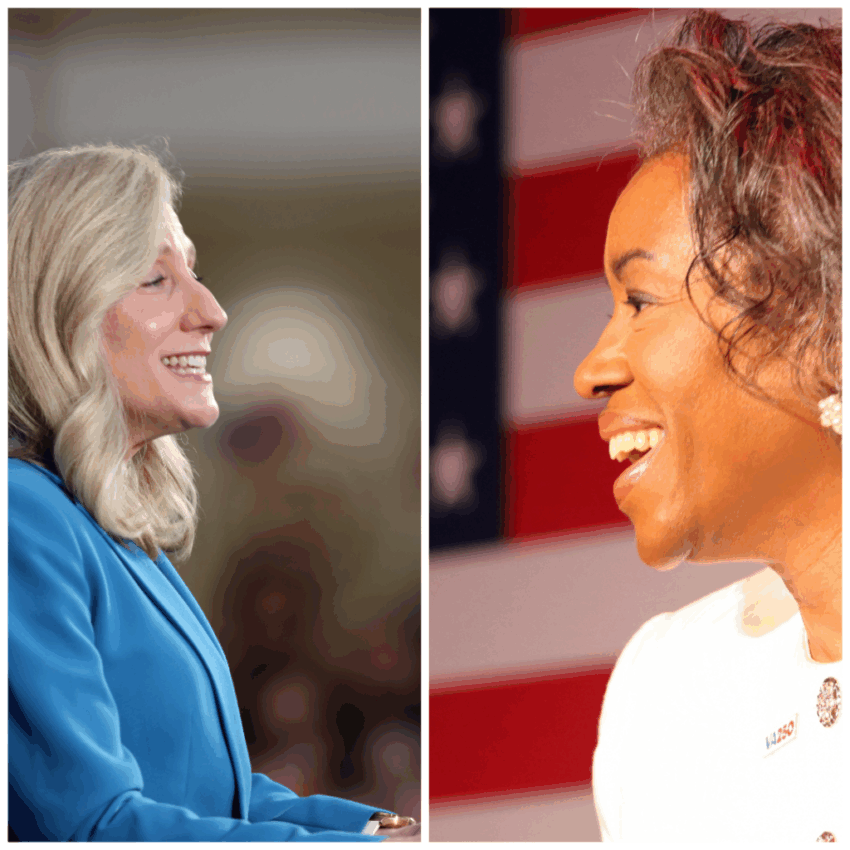Virginia gubernatorial candidates Abigail Spanberger (left) and Winsome Earle-Sears (right). (Photos by Charlotte Rene Woods/Virginia Mercury)
In Virginia’s governor’s race, the candidates aren’t just preparing to debate — they’ve been debating whether to debate.
Democratic gubernatorial nominee Abigail Spanberger announced Monday that she has accepted a debate set for Oct. 9, hosted by Norfolk State University and WAVY-TV.
Lt. Gov. Winsome Earle-Sears, the Republican nominee, had already agreed last Friday, according to a press release that her campaign said it had shared with reporters, but that The Mercury did not receive at the time.
“Spanberger hasn’t debated since she first ran for Congress,” the release said.
After flipping a previously-Republican-held district in 2018, Spanberger defended the seat for two more terms, debating one of the challengers. When challenged by former state delegate Nick Freitas, she debated him. During her second reelection campaign, she did withdraw from a planned debate against challenger Yesli Vega in 2022 over security concerns and disagreements about the moderator.
During the 2025 election cycle for governor, both Spanberger and Earle-Sears have passed on some debate opportunities.
Last week, Earle-Sears declined to participate in the “People’s Debate,” which would have been hosted at Virginia State University with AARP Virginia and WTVR-TV, citing a scheduling conflict.
While Spanberger had agreed to that forum, her campaign declined a CNN-hosted debate, saying that any debates should be carried by state and local media — the outlets a governor would work with most often.
“We believe that debates about Virginia’s future should be rooted in Virginia, produced by Virginia media, and accessible to Virginians across the commonwealth,” her campaign manager told CNN recently.
Peyton Vogel, a spokesperson for Earle-Sears emphasized in a text message to The Mercury Monday that her campaign had agreed to the Norfolk debate first, sharing a screenshot of last week’s announcement.
Meanwhile, Spanberger’s Monday statement declared that she “is ready to debate the issues.”
Political analyst Bob Holsworth said it’s not surprising to see candidates and their consultants showing “less interest in debates, because these are events where they don’t control the narrative.”
Holsworth added he was surprised Earle-Sears, who has trailed Spanberger in fundraising and polling so far this year, didn’t demand debates earlier in the campaign and remained silent when her running-mate, John Reid, pressed Democratic lieutenant governor nominee Ghazala Hashmi to debate.
On Spanberger’s moves, he said she “adopted a conventional front runner strategy” by limiting the amount of debates and choosing the venues.
By avoiding the CNN debate, she was also able to sidestep nationally focused moderators asking her about Democrats such as U.S. Rep. Alexandria Ocasio-Cortez, D-NY, and Zohran Mamdani, the Democratic nominee for mayor of New York City — two progressive members of their party that more moderate Democrats have had to contend with.
Both candidates have accused the other of being “too extreme” for Virginia. But on Oct. 9, they will have a chance to lay out competing visions for the state and challenge each other’s ideas. While both women have highlighted plans to strengthen Virginia’s economy, their party affiliations point to sharp differences in approach.
The stakes this year extend beyond the governor’s race. The lieutenant governor, attorney general and all 100 seats in the House of Delegates are also on the ballot. Whether Democrats hold their majority in the legislature could determine the future of a proposed constitutional amendment to protect reproductive rights in Virginia.
While bipartisan support has advanced measures to restore voting rights to ex-felons who’ve completed their sentences and to protect same-sex marriage, the reproductive rights amendment only cleared the legislature because Democrats are in control. If lawmakers pass it again next year, voters would decide its fate at the ballot box.
As for which woman might become Virginia’s top executive next year, Holsworth said ultimately voters may better know them through commercials and social media than through debates — where candidates face tough questions in high-stakes settings.
“This is increasingly the way of contemporary campaigns, and it’s not surprising that the public is frustrated with this trend,” he said.
YOU MAKE OUR WORK POSSIBLE.
Click this link for the original source of this article.
Author: Charlotte Rene Woods
This content is courtesy of, and owned and copyrighted by, https://www.virginiamercury.com and its author. This content is made available by use of the public RSS feed offered by the host site and is used for educational purposes only. If you are the author or represent the host site and would like this content removed now and in the future, please contact USSANews.com using the email address in the Contact page found in the website menu.








